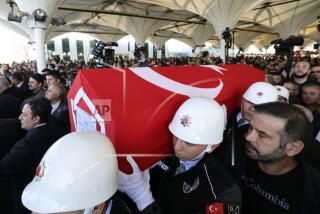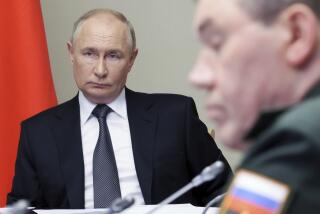Kurds Accuse Iraq of Using Poison Gas : At Least 60,000 Refugees Cross Border, Turkish Leader Says
- Share via
NICOSIA, Cyprus — Iraqi forces attacked Kurdish rebels in northern Iraq with poison gas Thursday, swelling an exodus of refugees to nearly 100,000 people, a spokesman for a Kurdish rebel group said.
The spokesman, representing the Kurdish Democratic Party, said in a telephone interview that four Iraqi army corps were being deployed along a 190-mile front extending to the Turkish border.
Fighting in the area has intensified since the July 18 announcement by Iran that it had accepted a cease-fire in its eight-year-old war with Iraq. Kurdish rebels have been heavily backed by Iran.
With surprising dexterity, the Iraqis have reportedly pulled thousands of troops out of areas where they had been engaged with Iranian forces and sent them north to join the fight against the Kurds, who have been agitating since the 19th Century for an independent homeland.
Diplomats said the government of Iraqi President Saddam Hussein may have felt that the Kurdish problem would have to be dealt with forcefully at some point and that the opportunity to use troops already in the field should be seized.
Hoshyar Zebari, a member of the Central Committee of the Kurdish Democratic Party, said reports from the front Thursday morning indicated that heavy gas attacks were taking place around Zakhu and Al Amadiyah, not far from the Turkish frontier.
Zebari said the apparent target of the gas attacks was the civilian population of the villages as well as camps of guerrillas loyal to the Kurdish Democratic Party and the rival Patriotic Union of Kurdistan.
“It’s a war of genocide, by all means,” Zebari said. “The Iraqis have got away with large-scale chemical warfare, with no state raising its voice in our support. This is a war for our survival.”
Iraq has maintained official silence about the current fighting in Kurdistan.
In Washington, State Department spokeswoman Phyllis Oakley said the United States could not confirm reports that Iraq was using chemical weapons but that “if the reports are accurate, this is a grave violation of international human rights standards.”
“We’re going to reserve further comment while we gather all the facts about this situation,” she said.
Later, a State Department official who asked not to be identified by name said that “given the pattern of past Iraqi use (of gas), the reports are certainly plausible.”
The official said Washington’s intelligence about events in the remote area is sketchy but that the United States has confirmed a major Iraqi offensive against Kurdish rebels.
The assault has driven thousands of Kurdish villagers north into Turkey. In Ankara, the Turkish capital, Prime Minister Turgut Ozal said in a statement broadcast by Turkish Radio that 60,000 Kurds, women and children for the most part, already had crossed into Turkey from Iraq. Other sources said the number might be twice that many, or more.
“Turkey will do everything possible to provide housing and help for the refugees and has started preparations,” Ozal said.
Zebari, the Kurdish rebel spokesman, said his organization estimates that the tide of refugees has swollen to about 100,000 people, most of them women, elderly men and children, as the result of the latest gas attacks.
“We believe the aim of this attack is to dislodge us from the area entirely,” he said. “It’s just the tip of the iceberg of what’s going to happen next.”
Since last year, the Iraqis have carried out a scorched-earth policy against large areas of Kurdistan, dynamiting villages and forcibly resettling Kurdish families.
But several thousand Kurdish guerrillas, supplied from across the border in Iran, have continued to fight against the Baghdad government, making roads unsafe after dark in a wide area.
Under the terms of the cease-fire agreement with Iran, the rebels presumably are not allowed to cross the border into Iran or to receive supplies from Iran.
The Kurds, who account for 20% of Iraq’s population, are an independent ethnic group and speak a language that is distinct from Arabic, the language of most Iraqis.
Times staff writer Norman Kempster contributed to this article from Washington.
More to Read
Sign up for Essential California
The most important California stories and recommendations in your inbox every morning.
You may occasionally receive promotional content from the Los Angeles Times.









